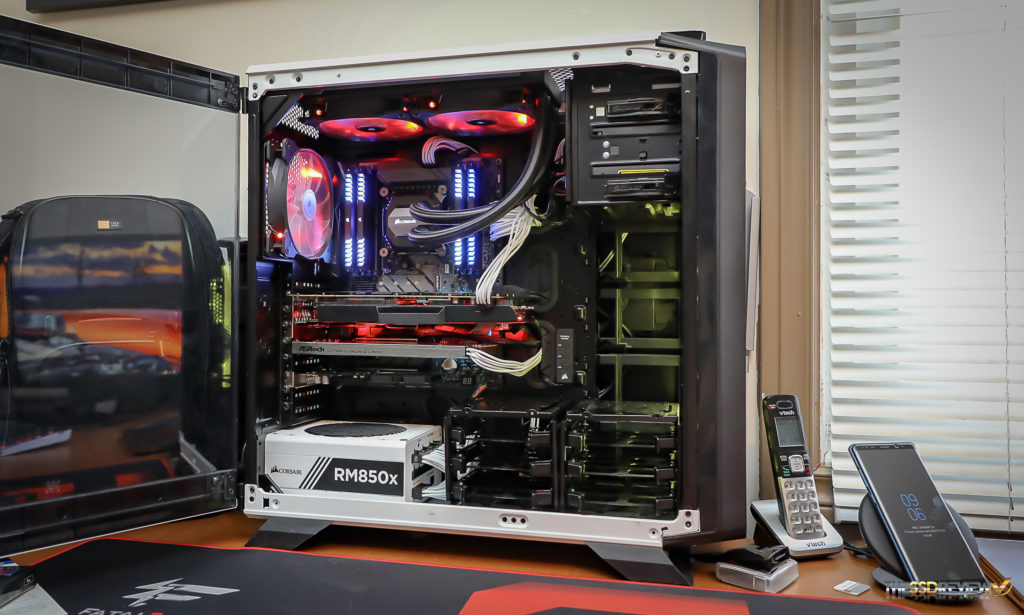TEST SETUP AND METHODOLOGY
For our testing today, we are using our newest ASRock X299 Fatal1ty Test Bench which has the Intel i9-7900X processor installed. We mention this because this processor has 44 PCIe 3.0 lanes and was the only motherboard we had on hand that allowed us to run our graphics card and the ASRock Ultra Quad M.2 RAID Card at full x16 bandwidth.
SSD testing at TSSDR differs slightly, depending on whether we are looking at consumer or enterprise SSDs. For consumer SSDs, our goal is to test in a system that has been optimized with our SSD Optimization Guide. To see the best performance possible, the CPU C states have been disabled, C1E support has been disabled, Enhanced Intel SpeedStep Technology (EIST) has been disabled. Benchmarks for consumer testing are also benchmarks with a fresh drive so, not only can we verify that manufacturer specifications are in line but also, so the consumer can replicate our tests to confirm that they have an SSD that is top-notch. We even provide links to most of the benchmarks used in the report.
THE SSD REVIEW ASROCK X299 FATAL1TY TEST BENCH
Clicking the title above will bring you to our full report and testing on our newest ASRock X299 Fatal1ty test Bench shown here:
SYSTEM COMPONENTS (linked to purchase pricing)
This Test Bench build was the result of some great relationships and purchase; our appreciation goes to those who jumped in specifically to help the cause. Key contributors to this build are our friends at ASRock for the motherboard and CPU, as well as Corsair for most of the components shown and listed. We have detailed all components in the table below and they are all linked should you wish to make a duplicate of our system as so many seem to do, or check out the price of any single component. As always, we appreciate your support in any purchase through our links!
| PC CHASSIS: | Corsair Arctic White 760T Graphite |
| MOTHERBOARD: | ASRock X299 Fatal1ty Pro Gaming i9 |
| CPU: | Intel i9-7900X 10 Core |
| CPU COOLER: | Corsair Hydro Series H115i |
| POWER SUPPLY: | Corsair RM850X |
| GRAPHICS: | PNY GeForce GTX 1080 XLR8 Gaming OC |
| SYSTEM COOLING: | Corsair HD140 RGBDual Fans with Controller |
| MEMORY: | Corsair Vengeance RGB DDR-3600 (32GB) |
| KEYBOARD: | Corsair Gaming K68 Mechanical |
| MOUSE: | Corsair Glave RGB Aluminum Gaming |
| MOUSE PAD: | Corsair Gaming MM800C Polaris RGB |
BENCHMARK SOFTWARE
The software in use for today’s analysis is typical of many of our reviews and consists of Crystal Disk Info, ATTO Disk Benchmark, Crystal Disk Mark, AS SSD, Anvil’s Storage Utilities, QuickBench, as well as PCMark Vantage. Our selection of software allows each to build on the last and provide validation for the others results.
Crystal Disk Info is a great tool for displaying the characteristics and health of storage devices. It displays everything from temperatures, the number of hours the device has been powered, and even to the extent of informing you of the firmware of the device.
Disk 1,2,3 and 4 are our Samsung 960 Pro M.2 SSDs in this Crystal Disk Info picture and represent our OS softRAID. It is a great way of confirming that, in fact, each is routing data through their own PCIe Gen 3 four lane configuration.
ATTO Disk Benchmark is perhaps one of the oldest benchmarks going and is definitely the main staple for manufacturer performance specifications. ATTO uses RAW or compressible data and, for our benchmarks, we use a set length of 256mb and test both the read and write performance of various transfer sizes ranging from 0.5 to 8192kb. Manufacturers prefer this method of testing as it deals with raw (compressible) data rather than random (includes incompressible data) which, although more realistic, results in lower performance results.
As we did in our HighPoint SSD7101A RAID Card Report, we can see that ATTO isn’t really comfortable testing either of these devices. Not only is the performance failing to display a steady increase as data sample size increases, but also, the speeds are nowhere near where they should be.
 The SSD Review The Worlds Dedicated SSD Education and Review Resource |
The SSD Review The Worlds Dedicated SSD Education and Review Resource | 


Does this support Raid 0 with trim?
RAID 0 no TRIM.
That’s kind of disappointing thanks for answering though
Not sure why it is disappointing when one considers the efficiency of GC and less importance of TRIM these days. The drive was made for Intel drives and VROC first and foremost…that is its ideal answer where there is no trim concerns whatsoever….and it is bootable
I was considering using some NVME (Toshiba, Samsung or maybe the new 700 drives from Intel) in raid as a scratch disk. I’ve been using Sata SSD’s in raid with trim and they perform really well but I’m only writing about 80MB/s and do a lot of write/erase even during the writing as it is. I’d be writing double if I decided to get M.2 drives.. unfortunately Sata SSD prices are increasing in price due to flash prices and maybe losing “popularity” compared to other options available now
TRIM support except RAID 5…but much more expensive. (links to sales included)
https://www.thessdreview.com/daily-news/latest-buzz/highpoint-ssd7101a-1-nvme-raid-controller-review-samsung-toshiba-m-2-ssds-tested/
Will Asrock Z690 PG RipTide support this card ? If yes, any limitations ?